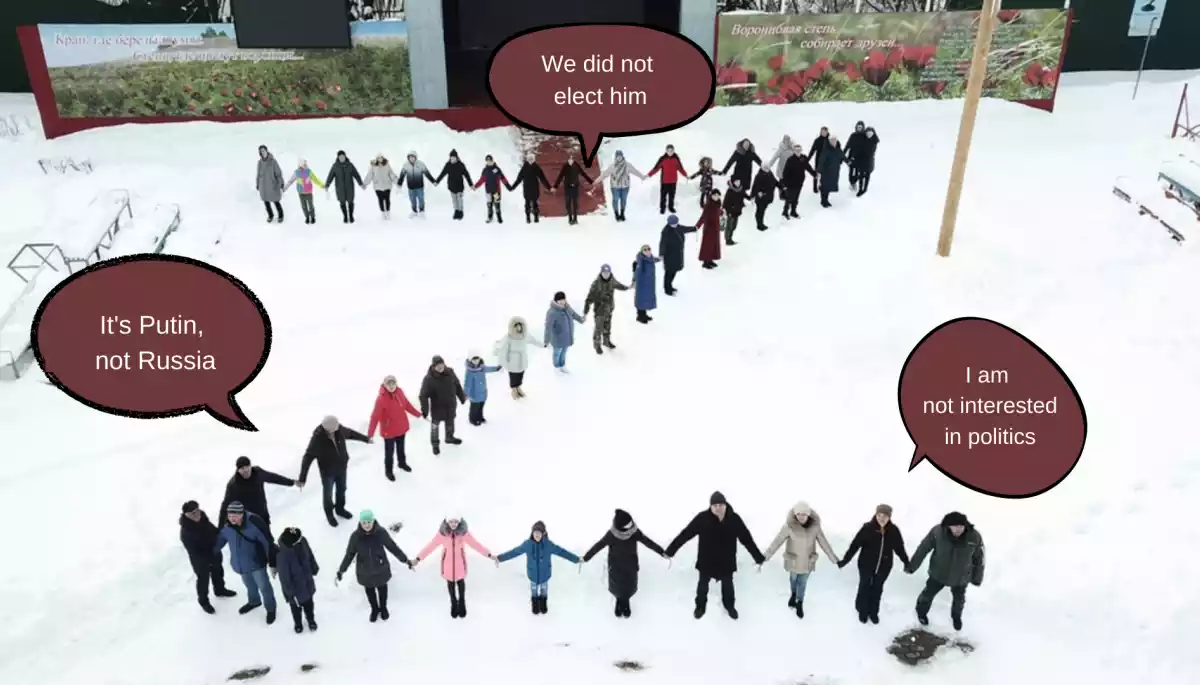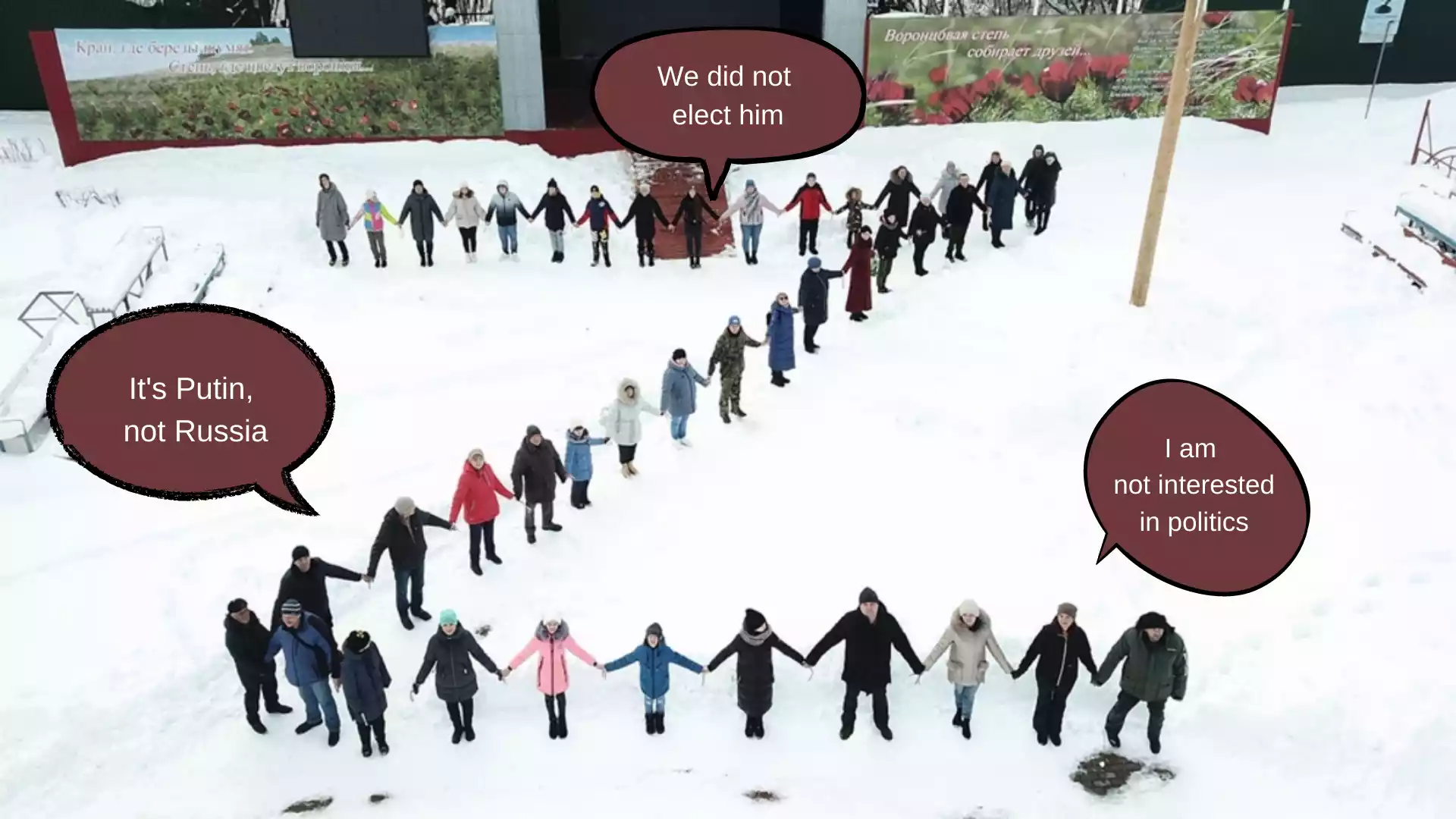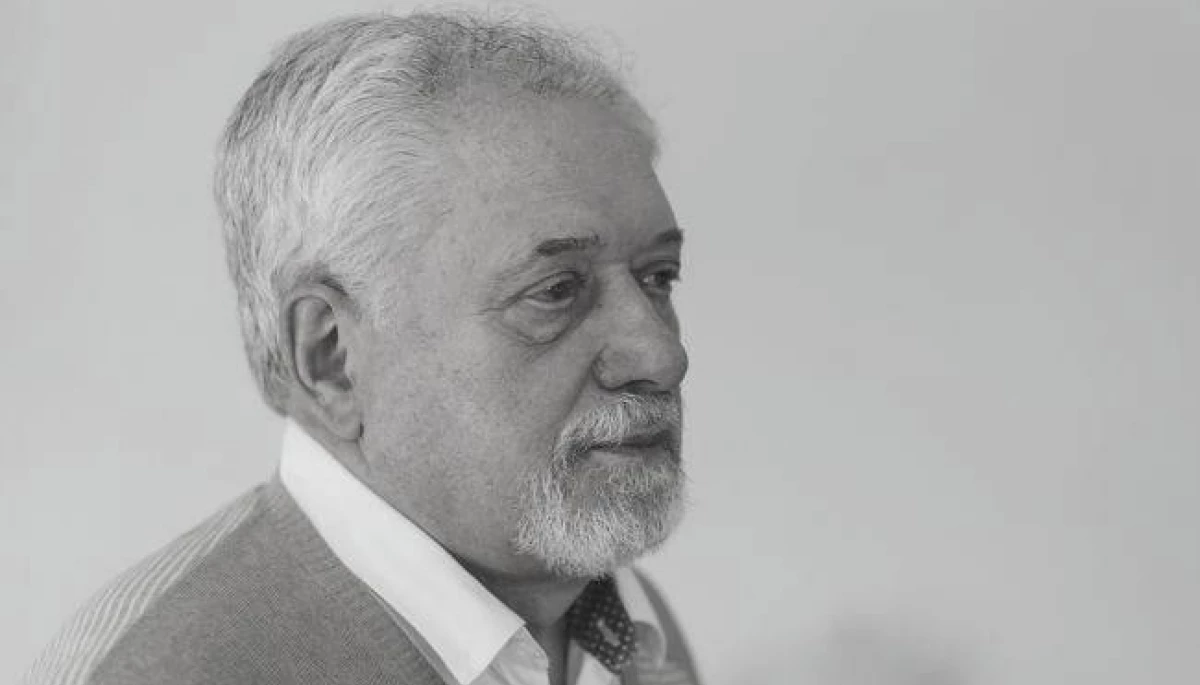
The reasons every Russian is responsible for this war


As McDonald's, Victoria's Secret and PlayStation pull out of the Russian market, Russians (at least those still not banned on social media) are increasingly asking: What does all this have to do with regular people? Why do they have to do without IKEA, and why are Ukrainians suddenly mad at them?
The part of Russia’s population that doesn’t love Putin is trying hard to distance itself from the bombing of Ukrainian maternity hospitals. They are trying to convince themselves — and the world — that ordinary Russians are good, they just have this evil ruler. Detector Media has collated the most common excuses, and explains why they do not work.
“Putin does not equal Russia.”
As long as Putin runs the country, and the people acknowledge him as a legitimate president and obey his orders, Putin represents Russia.
“Putin is to be blamed, not Russians.”
It was not Putin who came to Ukraine riding a tank, nor 190,000 of his clones: it was 190,000 Russians. Russians hit houses in Kyiv, Russians fired rockets at the center of Kharkiv, and Russians engaged in shelling during evacuation attempts from Sumy, Chernihiv, Bucha, and Irpin.
The tens of thousands of OMON and police officers who detain people at peaceful rallies, the State Duma members, the huge machine of bureaucracy — all are Russians acting in support of Putin's decision, or simply following what appear to be criminal orders.
Russians develop and build weapons for Russia. Russians work for its propaganda machine: TV presenters, “journalists,” bloggers, and opinion leaders who readily agreed to promote the recent constitutional amendments. Russians spread Kremlin rhetoric for money, or simply out of sheer enthusiasm, writing “You have been bombing Donbas for eight years” under every online post.
Russians support and legitimize the occupation of Crimea. According to Russian statistics, 6.3 million tourists visited the peninsula in 2020 alone, and many Russian entertainers have performed at Crimean resorts.
“These all are the personal ambitions of one senile madman.”
When we reduce the Russian aggression to Putin's personal ambitions, we are ignoring centuries of Ukrainian history. Russia sought to seize Ukrainian lands, destroy our culture, and deny the existence of Ukraine as a separate nation under various political regimes. This story did not start with Putin and it will not end with his death.
Being anti-Putin and anti-war does not necessarily mean that a person does not have imperial views – that they do not believe the historical myths of a single nation, Russia as an “older brother,” lands “donated” to Ukraine, and the like. Russians continue to engage in this rhetoric both in Russia and abroad. According to a CNN poll, 64% of Russian respondents consider Ukrainians and Russians to be one people. In Ukraine, this figure is much lower: 28%.
“People are against war.”
It is extremely difficult to obtain independent polling data in Russia; it could show actual support for military aggression against Ukraine. It is also inaccurate to form an impression based on individual posts and comments on social media. However, according to the CNN poll, 50% of Russians believe it is appropriate to use military force to keep Ukraine from joining NATO.
43% of respondents believe it is wrong to use military force in order to unite Russia and Ukraine. But 36% support this idea. It is not only Putin and a small, marginal group of his supporters who are in favor, but a third of the people in this survey.
“We support peace, we say ‘no war.’”
These slogans do not necessarily mean that a person condemns the Russian aggression. They can mean very different things for different people: from “Russia must retreat,” to “Ukraine must surrender,” “Both parties are to blame,” “The West started it all,” “We had no choice,” and so on. A striking example is the open letter by Russian TV anchor Ksenia Sobchak, in which she writes about her fear of nuclear war. “No global geopolitical interests can be more important than the simple, peaceful life of millions of people!! Vladimir and Vladimir! Concede to each other today!!!” These are the words of a person who is often regarded as a “good” and liberal Russian. She broadcasts to her audience of nine million people the idea that Ukraine, which has been attacked, must concede.
“I personally am not shooting at anyone.”
Everyone who lives, works, or does business in Russia is financing this war. Putin does not personally buy Grads, or pay the Wagner group with his own money; it is all paid for out of the national budget. In 2022, Russia planned to allocate 3.5 trillion rubles, or 15% of all budget expenditure, for “national defense.” Not every Russian pulls the trigger, but everyone buys ammunition.
“We did not elect him.”
We do not know the real level of support for Putin and his actions, as elections in Russia can hardly be considered fair and democratic. But the problem of authoritarianism in Russia did not arise on February 24, as Putin has been in power for 22 years. And those who did not elect him made the choice to be apolitical – the choice to take no public stance, to avoid controversial topics in their work, in social media posts, in conversations with the family. Silently tolerating crime is also a choice. This is criminal inaction.
“They didn’t know where they were going.”
We have already found evidence this whole “we don’t know” thing is merely an enemy tactic, and that the occupiers had been preparing for an invasion. For example, here are the plans for taking over Ukraine in 15 days. And here is the testimony of a prisoner who describes how the occupiers intended to take Kharkiv in three days.
This full-scale war has been going on for two weeks. Are Russian soldiers still unaware of where they are going? They don’t know who they are shooting, they don’t know where the cruise missiles end up? It seems that they may well know, they just don’t care.
“We cannot change anything.”
It is scary and dangerous to protest in Russia now. However, Ukrainians are not persuaded by this, as we know from our own experience how hard it is to obtain freedom.
Over the years, Russians could have changed many things, aside from the government itself. For example, people could start to shake off the comatose, “apolitical” national mindset. Or study media literacy. Until recently, Russia had Internet access to international media and social media. People there could access Ukrainian websites, most of which have versions in Russian. They had eight years to make sense of how Crimea was seized, and who was shooting whom in the territory of Donbas.
People had time to unfollow all the Kremlin's mouthpieces, paid bloggers, and political pundits. They had time to make sure reputation meant something in Russia, which would mean that celebrities like Nikolay Baskov, who actively supports the authoritarian regime, would not get the popularity and admiration they currently have.
They had time to learn to use the correct prepositions with Ukraine, confirming that it is an actual country. Unless, of course, you can get arrested for this, too.
“What have athletes/artists/cats done wrong? Why should they be banned from international events?”
They represent Russia on the international stage — the state that has invaded independent Ukraine and is killing people there. And they are waving the flag that the occupiers dream of flying over Ukrainian cities. They even draw a “Z” on their uniform, which has already become a symbol of the occupiers’ troops.
“I am not ashamed.”
If you spend enough time on social media, you may feel like you don’t know what is going on anymore. On the one hand, you find the world with the hashtags #Мненестыдно (#Im_not_ashamed), #СвоихНеБросаем (#we_dont_give_up_on_our_people), #stoprussianhate. The Russians of this world are proud of their origins, country, culture, strong army, and the president.
On the other hand, there is a world with “ordinary people” who “have not chosen anything and cannot change anything” under every photo of bombed Ukrainian cities, under every appeal to Russia. But there is only one reality: you cannot be great and disempowered at the same time. You cannot take ballet and Dostoevsky and leave out corruption, OMON, and the bombing of Kharkiv. This is all their Russia.
Of course, not all Russians are evil, not all of them are even guilty of this war. But everyone identifying with Russia bears a responsibility for it. At this point, saying #notowar is not enough to escape the war.













